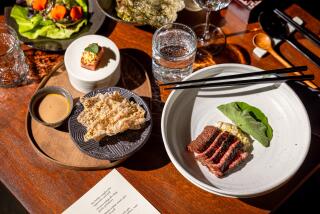Taking a Camp Look at Search for Borscht
- Share via
We were tossed out of a rowdy beer bar on the infamous Reeperbahn in Hamburg. (Don’t ask why.) We were thrown off a beach on the Baltic Sea outside Leningrad. We were escorted out of a Moscow restaurant by a dozen dour-looking men in matching gray suits. We were ushered off an Odessa sidewalk we had been driving down in a 50-person bus. We were robbed. All 50 of us became ill from less-than-pristine conditions, mostly of our own making.
It was great.
I am not complaining about this but neither am I embarrassed, although perhaps I should be. I also am not suggesting that other trips of the sort--journeys that take adventurers with more time than money on inexpensive trips from London across Europe, Asia and Africa--are like that. I’m sure our trip was a fluke of nature or just one of those events in life that spirals slightly out of control.
In exchange for expense, we pitched tents each night in camping parks inhabited by local tourists. We cooked our own food after shopping in local markets. Meat and cheese were luxuries. Canned pilchards and bread weren’t. We were constantly hungry. When it rained, we got wet. Showers often were in cold water, even when the weather was frosty.
When we arrived in cities such as Moscow and voted on whether to attend the Bolshoi or visit a few night spots, the ballet did not reap enough votes to make the itinerary. On the other hand, we drank vodka and danced many evenings away with the local people. And we saw the same sites at a fraction of the cost as those being comfortably ushered in private cars.
Similar, although more serene trips can be booked in the U.S. through the Adventure Center, 1311 63rd St., Suite 200, Emeryville, Calif. 94608, (415) 654-1879.
It was on such a six-week camping tour of the U.S.S.R. that I ended up hungry in Leningrad.
This led me to a cafeteria-style restaurant I had heard about from a black market money vendor at Petrodvorets, the summer palace of several Russian czars. He said the food was good and inexpensive. That was recommendation enough.
When the language is not familiar, usually it is possible to point to a few words on a menu and hope for the best. But there was no printed menu. People appeared to be ordering on instinct, paying for the food at a cashier, getting a paper docket, walking through the line, presenting the ticket to the food servers and getting a plate of lunch in return.
This presented a logistical puzzle for someone who didn’t speak Russian.
I first tried going through the line, hoping that the food servers would take pity and serve me anyway. No such luck.
Next I tried walking through the line with paper and pen, hoping the food servers would write down the prices of a few foods I pointed out. What they understood was that I was hungry. They just didn’t know what I wanted them to do about it.
I began making the rounds of the tables, checking out attractive meals, pointing and offering the patrons pen and paper to write down the food names in Russian. I took the paper to the cashier, held out my money and allowed her to take what she needed. She gave me the dockets. I offered them to the food servers who presented me with two huge plates of food, black bread and borscht. The borscht was steaming and sour/sweet. The bread was heavy with butter. The rest of the meal became irrelevant.
It was the beginning of September but the weather was dreadfully cold, if you were wearing shorts. After a morning spent gasping at the wonders of the Hermitage, hot soup was more than welcome to someone with blue fingernails.
Actually a whole class of soups, borscht generally contains beets, but not always. It usually contains onions and cabbage, if the cook wants. It often is served hot, except during the summer when it is served cold. It has a distinctive sweet/sour flavor, although not everyone makes it that way. I guess you could say it’s similar to American chili, in the sense that there are rules for making it but few people adhere to them.
Top it with sour cream and fresh dill and serve it with black bread and butter. But only if you want.
COLD-WEATHER BORSCHT
2 quarts beef broth
3 beets, peeled and julienned
1 medium onion, chopped
2 cups cabbage, coarsely grated
1 potato, peeled and coarsely chopped
1 bay leaf
2/3 cup red wine vinegar
1/4 cup sugar
2 cups tomatoes, seeded and coarsely chopped
1/4 cup tomato paste
1/3 cup minced fresh dill
1 to 2 cups cooked and shredded lamb or beef
Salt, pepper
Sour cream, minced fresh dill
Black bread and butter
In large saucepan or Dutch oven, combine beef broth and beets. Bring to a boil, cover and simmer 15 minutes. Add onion, cabbage, potato and bay leaf and continue simmering until vegetables are tender, about 20 minutes more. Add vinegar, sugar, tomatoes, tomato paste and dill and simmer 15 minutes. Add meat and continue cooking about 5 minutes to heat through. Season to taste with salt and pepper. Garnish each serving with a spoonful of sour cream sprinkled with chopped dill, with black bread and butter on the side. Serves about 6 to 8 as an entree.
NOTE: This is best made a day in advance and refrigerated until reheating so that flavors have a chance to blend.
More to Read
Sign up for The Wild
We’ll help you find the best places to hike, bike and run, as well as the perfect silent spots for meditation and yoga.
You may occasionally receive promotional content from the Los Angeles Times.






